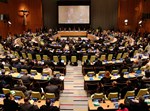Echoes in the press
Published on Thu, 2016-09-08 19:17
Arab NGO Network for Development (ANND) held a seminar to discuss issues related to Business and Human Rights in the context of the Pilot Project for the Promotion of Social Dialogue in the Southern Mediterranean Region. |
Published on Mon, 2016-07-18 11:42
Inequality has been center stage at the United Nations headquarters in recent days, as government officials, development experts and civil society representatives gathered for the first meeting of the High-Level Political Forum on Sustainable Development (HLPF) since the Sustainable Development Goals (SDGs) were agreed. The HLPF is the main platform for the follow-up and review of the 2030 Agenda for Sustainable Development. The theme of this year’s HLPF – and one of the most potentially transformative elements of the Agenda – is the critical commitment to “leave no one behind.” |
|
Source: . Published on Mon, 2016-07-18 00:00
MUCH is made of the public-private partnership (PPP). This is where the public and private sectors combine to produce outcomes which are favorable to the nation. In practice, this has meant Luzon-based transportation infrastructure projects. Visayas and Mindanao have been largely left out. President Duterte will change this. Which is partly why a whopping 62 percent of Mindanaoans voted for him. In a presidential contest where there were four highly supported candidates, this is a remarkable mandate. |
|
Source: . Published on Thu, 2016-07-14 20:59
“No dejar a nadie atrás” pasó a ser el lema de los Objetivos de Desarrollo Sostenible (ODS) de la ONU, pero queda mucho por hacer para llegar a concretarlo, coincidieron esta semana organizaciones de la sociedad civil en una conferencia de revisión de los avances de la Agenda de Desarrollo Posterior a 2015. A diferencia de los los Objetivos de Desarrollo del Milenio de la ONU (Organización de las Naciones Unidas), que no lograron atender la desigualdad estructural, la sostenibilidad ecológica y las responsabilidades del Norte global, la Agenda 2030 para el Desarrollo Sostenible reconoce “la enorme disparidad de oportunidades, de riqueza y de poder” como inmensos desafíos para lograr el desarrollo sostenible, una novedad en materia de documentos intergubernamentales. En el primer año de los 15 de la Agenda para 2030 todavía deben verse los cambios en el camino hacia el desarrollo global, según el informe Spotlight on Sustainable Development 2016 (El foco en el desarrollo sostenible), publicado esta semana por el Grupo de Reflexión de la Sociedad Civil. |
|
Source: . Published on Thu, 2016-07-14 20:59
In New York heeft een topontmoeting plaats over de duurzame ontwikkelingsdoelstellingen, beter gekend als de Sustainable Development Goals (SDG’s). Op dit zgn High Level Political Forum (HLPF) wordt een eerste stand van zaken opgemaakt over hoe landen zich inzetten voor een betere wereld tegen 2030. |
|
Source: . Published on Wed, 2016-07-13 11:30
Although “leave no one behind” has become a central rallying cry around the UN’s Sustainable Development Goals, more needs to be done for it to be put into practice, civil society said during a review conference of progress made on the Post-2030 agenda here this week. Unlike the UN’s Millennium Development Goals (MDGs) which failed to address structural inequality, ecological sustainability, and the responsibilities of the global North, the 2030 Agenda acknowledges the “enormous disparities of opportunity, wealth, and power,” as immense challenges to sustainable development – a first for an intergovernmental document. |
|
Source: . Published on Wed, 2016-07-13 11:30
CIUDAD DE MÉXICO (apro).- Al favorecer los megaproyectos por encima de los derechos civiles, políticos, sociales, culturales y ambientales de la población mexicana, la reforma energética pone en peligro el cumplimiento de siete de los 17 Objetivos para el Desarrollo Sostenible (ODS), según la organización Social Watch. Con estos objetivos, los países miembros de las Naciones Unidas aspiran a erradicar la pobreza, reducir las desigualdades, proteger la naturaleza y promover los derechos humanos en el mundo hacia el horizonte 2030. |
|
Source: . Published on Tue, 2016-07-12 00:00
L’économie tchèque a beau croître et le taux de chômage être à un niveau historiquement bas, le niveau de vie en République tchèque progresse relativement lentement, trop lentement en tout cas pour rattraper les pays européens les plus développés. Tel est le principal constat du huitième rapport annuel de la branche tchèque de la plate-forme Social Watch publié ce lundi. Explications avec l’économiste Ilona Švihlíková. |
|
Source: . Published on Tue, 2016-07-12 00:00
As the United Nations High-level Political Forum on Sustainable Development started its first review of the 2030 Agenda for Sustainable Development and the Sustainable Development Goals (SDGs) July 11-20, civil society coalitions from around the world brought to New York their own findings, calling on member states to take note of these. Because the Forum is the UN’s central platform for the follow-up and review of the 2030 Agenda adopted by world leaders on September 25, 2015. It is slated to adopt a Ministerial Declaration to provide political leadership, guidance and recommendations on the 2030 Agenda’s implementation and follow-up; keep track of progress of the SDGs; spur coherent policies informed by evidence, science and country experiences; as well as address new and emerging issues. |
Published on Mon, 2016-07-11 13:22
As the High-Level Political Forum (HLPF) convenes this week to review implementation of the Sustainable Development Goals (SDGs), CESR’s Kate Donald and Lena Kahler examine whether the new agenda will live up to its promise of promoting accountability and “leaving no one behind”. As the global follow up and review mechanism for the 2030 Agenda for Sustainable Development adopted at the UN nine months ago, the HLPF is where world leaders will take stock of countries’ SDG performance and address challenges in implementation. Yet serious doubts remain as to whether it will deliver on its mandate to “provide political leadership, guidance and recommendations on the Agenda's implementation and follow-up” as well as ensure accountability for the goals. |
SUSCRIBE TO OUR NEWSLETTER











